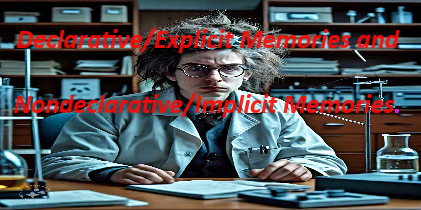Declarative/Explicit Memories and Nondeclarative/Implicit Memories.

Declarative/Explicit Memories and Nondeclarative/Implicit Memories.
-
-
NONDECLARATIVE MEMORIES
-
We have implicit, or nondeclarative, memories, sometimes also called procedural memories.
This kind of memory kicks in when you’ve done something so many times that you aren’t even consciously aware of how you do it.
You’ve repeated it so often that now your body knows it as well as your brain.
Think of riding a bike, operating a clutch, tying your shoes, tapping a phone number or a PIN on a keypad, or even reading or speaking.
You could say that you no longer have to analyze or consciously think about the skill or habit you’ve mastered because it’s now subconscious.
Since implicit memories are developed from the emotions of experience, two possible scenarios explain how this unfolds:
- A highly charged one-time emotional event can be immediately branded and stored in the subconscious (for example, a childhood memory of being in a big department store and getting separated from your mother),
- The redundancy of emotions derived from consistent experience will also be repeatedly logged there.
Since implicit memories are part of the subconscious system of memory and are routed there either by repeated experience or by highly charged emotional events, when you bring up any emotion or feeling, you’re opening a door to your subconscious mind.
Since thoughts are the language of the brain and feelings are the language of the body, the moment you feel a feeling, you’re turning on your body-mind (because your body has become your subconscious mind).
You’ve just entered the operating system.
Think about it like this:
When you feel a certain familiar way, you’re subconsciously accessing a series of thoughts derived from that particular feeling.
You’re auto-suggesting thoughts daily equal to how you feel.
These are the thoughts you accept, believe, and surrender to as if they were true.
Therefore, you’re more suggestible only to the thoughts that are matched to the same feeling.
As a result, those thoughts that you unconsciously think about are the ones you accept, believe, and surrender to over and over.
Conversely, it could also be said that you’re much less suggestible to any thoughts that are not equal to your memorized feelings.
Any new thought that reflects an unknown possibility just wouldn’t feel right.
Your self-talk (the thoughts that you listen to every day) slips by your conscious awareness on a moment-to-moment basis and stimulates the autonomic nervous system and the flow of biological processes, reinforcing the programmed feeling of who you think you are.
By the same means, if you were to change how you feel, could you become more suggestible to a new stream of thoughts?
Absolutely!
By feeling an elevated emotion and allowing a whole new set of thoughts to be driven by that new feeling, you’d increase your level of suggestibility to what you were feeling and then thinking.
You’d be in a new state of being, and your new thoughts would then be the autosuggestions equal to that feeling.
And when you feel emotions, you’re naturally activating your implicit memory system and the autonomic nervous system.
You can simply allow the autonomic nervous system to do what it does best: restore balance, health, and order.
-
-
DECLARATIVE MEMORIES
-
The conscious mind is where we store our explicit, or declarative, memories.
Therefore, declarative memories are memories that we can declare.
They’re the knowledge we’ve learned (termed semantic memories) and experiences we’ve had in this lifetime (episodic memories).
You might be a person;
- who grew up in Palace;
- who rode horses in childhood until you fell off and broke your arm;
- who had a pet at age 10 that escaped from its cage, requiring you and your family to sleep at a hotel for two days;
Also Read: Do You Know Fasting Can Boost Brainpower?
- who won the state spelling bee at age 14 and now never misspells a word;
- who studied accounting in college;
- who presently lives in the United Kingdom so that you can be near your sister (who took a job for a large corporation);
- who is now getting a master’s degree in finance online.
Declarative memories are the autobiographical self.
Join Enlighten Knowledge WhatsApp platform.
Join Enlighten Knowledge Telegram platform.








